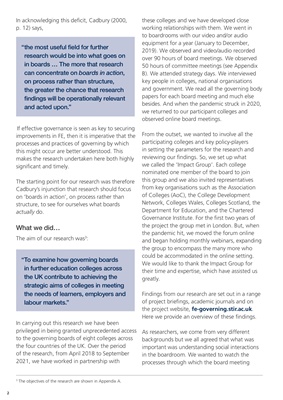
In acknowledging this deficit, Cadbury (2000,
p. 12) says,
If effective governance is seen as key to securing
improvements in FE, then it is imperative that the
processes and practices of governing by which
this might occur are better understood. This
makes the research undertaken here both highly
significant and timely.
The starting point for our research was therefore
Cadbury's injunction that research should focus
on 'boards in action', on process rather than
structure, to see for ourselves what boards
actually do.
What we did…
The aim of our research was3:
In carrying out this research we have been
privileged in being granted unprecedented access
to the governing boards of eight colleges across
the four countries of the UK. Over the period
of the research, from April 2018 to September
2021, we have worked in partnership with
these colleges and we have developed close
working relationships with them. We went in
to boardrooms with our video and/or audio
equipment for a year (January to December,
2019). We observed and video/audio recorded
over 90 hours of board meetings. We observed
50 hours of committee meetings (see Appendix
B). We attended strategy days. We interviewed
key people in colleges, national organisations
and government. We read all the governing body
papers for each board meeting and much else
besides. And when the pandemic struck in 2020,
we returned to our participant colleges and
observed online board meetings.
From the outset, we wanted to involve all the
participating colleges and key policy-players
in setting the parameters for the research and
reviewing our findings. So, we set up what
we called the 'Impact Group'. Each college
nominated one member of the board to join
this group and we also invited representatives
from key organisations such as the Association
of Colleges (AoC), the College Development
Network, Colleges Wales, Colleges Scotland, the
Department for Education, and the Chartered
Governance Institute. For the first two years of
the project the group met in London. But, when
the pandemic hit, we moved the forum online
and began holding monthly webinars, expanding
the group to encompass the many more who
could be accommodated in the online setting.
We would like to thank the Impact Group for
their time and expertise, which have assisted us
greatly.
Findings from our research are set out in a range
of project briefings, academic journals and on
the project website, fe-governing.stir.ac.uk.
Here we provide an overview of these findings.
As researchers, we come from very different
backgrounds but we all agreed that what was
important was understanding social interactions
in the boardroom. We wanted to watch the
processes through which the board meeting
2
"�the�most�useful�field�for�further�
research would be into what goes on
in boards … The more that research
can concentrate on boards in action,
on process rather than structure,
the greater the chance that research
findings�will�be�operationally�relevant�
and acted upon."
" To examine how governing boards
in further education colleges across
the UK contribute to achieving the
strategic aims of colleges in meeting
the�needs�of�learners,�employers�and�
labour markets."
3 The objectives of the research are shown in Appendix A.